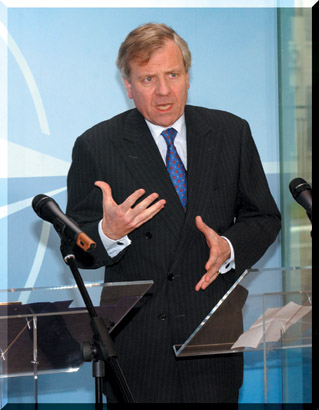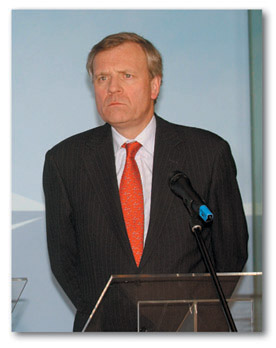| JAAP DE HOOP SCHEFFER | NATO Secretary General |
|
The Enhancement Of NATO's Mediterranean Dialogue Opens Fresh Opportunities |

 Over the last year, I had the pleasure to visit NATO’s Mediterranean Dialogue partners in North Africa and the Middle East. During all these visits, I have explained how North America and Europe, working through NATO, are responding to a fundamentally different, complex security environment. And I have underlined our strong interest in engaging our Mediterranean partners in the common effort to tackle the serious security challenges before us.
Over the last year, I had the pleasure to visit NATO’s Mediterranean Dialogue partners in North Africa and the Middle East. During all these visits, I have explained how North America and Europe, working through NATO, are responding to a fundamentally different, complex security environment. And I have underlined our strong interest in engaging our Mediterranean partners in the common effort to tackle the serious security challenges before us. That is the main message which I carry to Egypt as well. And I am very pleased with the way in which it has been received here in Cairo. Not one of our nations is immune from today’s risks and threats, be it the scourge of terrorism, the proliferation of weapons of mass destruction, the breakdown of weak states or the trafficking of human beings, arms and drugs. And no one is capable of tackling all these challenges on its own. The only way to deal with them is through sustained international cooperation, drawing on all the different instruments that we have available to us as an international community.
For the past few years, building on its successful ongoing experience in the Balkans, the NATO Alliance has successfully promoted precisely that kind ofconcerted action. Through more flexible military capabilities. Through broadened partnerships. And through close cooperation with key organisations, in particular the United Nations and the European Union. Soon after the terrorist attacks of 11 September 2001, the Alliance launched a maritime operation "Operation Active Endeavour" to help deterring terrorism in the Mediterranean Sea. Over the past fouryears, NATO forces have monitored more than 60,000 vessels, and over 500 ships have taken advantage of NATO escorts.
Russia is expected to support this operation with ships from the beginning of next year. And several non-NATO nations including Algeria, Israel and Morocco have expressed an interest in working with us. We are exploring how we can best involve them in this important enterprise.
For the past two years, NATO has also been in command of the UN-mandated International Security Assistance Force in Afghanistan. Our involvement is a key element of the international community’s effort to help create a sovereign, safe and secure Afghanistan, which will never again be a safe haven for terrorists. I accompanied the members of the NATO Council on a visit to the country, where we met with President Karzai. He expressed his profound appreciation for NATO’s role in ensuring the success of last month’s parliamentary elections. And he welcomed our determination to extend the Alliance’s presence to the southern part of Afghanistan as a clear sign of our longer-term commitment to future of his country. For just over a year now, the Alliance has also been running a mission to train and equip Iraqi security forces, in order to help the Iraqi Government to meet the basic security needs of its people in the context of UN Security Council resolution 1546.
I was in Iraq just for the opening of the NATO Training and Education Centre in Ar-Rustamiyah, indoing so underlining NATO’s continuing commitment. Over the past few months, we have also seen broad, international engagement with respect to the terrible crisis on Darfur, and here as well, the Alliance has made a significant contribution. In response to a request by the African Union, NATO, together with the European Union, has already helped to airlift several thousands of African Union peace keeping troops to the region. In addition, the Alliance is training African Union troops in running a multinational military headquarters and managing intelligence. Why are we doing this? Because we want to help implement African solutions to African problems.
I am aware that NATO’s engagement outside its traditional area of operations has raised questions here in this country and in the region. It is also to address these questions that I am visiting our partners from the Mediterranean Dialogue. Let me make two points here. First, that NATO has no intention to be the "global policeman". Allies have neither the desire nor the necessary capabilities to take on the job of the "gendarmes du monde" as they would say in French. Second, as you may have picked up from my comments regarding Afghanistan, Iraq or Darfur, NATO is taking on these complex missions by working hand in hand with the rest of the international community, starting with the United Nations and the EU: only effective multilateral cooperation can provide lasting answers tothe security threats and challenges we all face.
NATO has long recognised the strategic importance of the Mediterranean region. More than ten years ago, in 1994, we launched our Mediterranean Dialogue with, initially, five countries in the southern Mediterranean, including Egypt. This was the Alliance’s first attempt at building new relationships across this region. Our main objective was to promote greater mutual understanding, confidence and transparency. And this initiative met with a generally positive response by our Mediterranean partners.
In June of last year, at NATO’s Istanbul Summit, the NATO Allies agreed, in close consultation with Egypt and the other Mediterranean Dialogue countries, to give a significant boost to the Mediterranean Dialogue process. To make a qualitative leap from limited contacts to much more extensive political and practical cooperation. In short, to move fromdialogue to genuine partnership.
Over the past sixteen months, we have made good progress in realising that ambition, and I am particularly pleased with Egypt’s strong interest ingreater cooperation. I very much appreciate the personal involvement of Foreign Minister Gheit, who attended the first-ever meeting at Ministerial level between NATO and its Mediterranean Partners in Brussels last December, and whom I met again in New York. But I also wish to commend all the other people in this country who have helped to define how Egypt might benefit from thegreater opportunities that are now on offer for cooperation with the Alliance. There remains work to be done, especially in bringing our publics along, but I believe that we are off to a very good start.
As we moveforward in strengthening the Mediterranean Dialogue process and the relationship between Egypt and NATO, there are a number of basic principles that I believe we should keep in mind. Let me outline them for you. The first principle is joint ownership. NATO is not imposing anything on any of its Mediterranean partners, but offering to work together in areas in which it has experience and expertise. It is up to Egypt and other interested countries to engage with NATO. We want them to be shareholders in a cooperative, two way street like effort.
The second principle: non-discrimination. NATO does not treat any of its Mediterranean partners different from the others. The same possibilities for dialogue and cooperation are available to all. Third:self-differentiation. While the same "basic menu" is available to all our Mediterranean partners, we realise that the security requirements of Egypt are different from those of, say, Morocco. That is why NATO is keen to work with interested countries on an individual basis, and to define together with them how their specific security needs can best be met. Finally, and importantly: complementarity. We know that Egypt and our other Mediterranean partners work with many different nations and organisations, including the European Union and the OSCE. NATO wants to complement those efforts, rather than to duplicate or to complicate them.
Practical cooperation is where NATO’s comparative advantage clearly lies, and there are many opportunities for us to engage in such cooperation. For example, I know that mine detection is a clear concern to your country and I intend to discuss with my Egyptian interlocutors possibilities to work together on this issue in the framework of NATO’s Science for Peace Program. The fight against terrorism is a very obvious area for mutually beneficial practical cooperation. We have already started to explore possibilities for greater intelligence sharing. Another avenue for practical, operational cooperation would be for Egypt to join several other Mediterranean partners in contributing to "Operation Active Endeavour", NATO’s maritime operation in the Mediterranean that I mentioned at the beginning of my remarks.
Joint ownership; non-discrimination; self-differentiation; and complementarity. These are the key principles that will guide the development of the Mediterranean Dialogue process and NATO’s future relationship with Egypt. Those same principles also apply to another initiative that NATO has launched more recently, our IstanbulCooperation Initiative or ICI.
Through the ICI, NATO seeks to build new ties with countries in the Broader Middle East that are outside the more established Mediterranean Dialogue framework. Several Gulf states have shown interest in cooperating with NATO on defence and security matters. We have made good progress towards the development of individual work programmes with Bahrain, Kuwait, Qatar and the United Arab Emirates. And I am optimistic that more countries in the Gulf region will follow in their footsteps.
It is clear that the future of the broader region of the Middle East depends very much on the Middle East peace process. In the past, the frustrating lack of progress in this process had limited the development of our relations. As long as the peace process was stalled, any cooperative outreach initiatives whether by NATO, the European Union or others were bound to suffer from a lack of trust. Thankfully, it looks like that is about to change.
Thanks in no small part to the sustained efforts of this country, we now do see progress in the Middle East peace process. A new Palestinian leadership, with whom NATO had fruitful first exploratory contacts, Israel’s bold withdrawal from the Gaza strip, and renewed political engagement in a number of capitals. These developments have brought a new, positive dynamic to the process, and raised hopes and expectations all over the world.
NATO is not playing an active role in this peace process. But I have said many times that we should not rule out a role for the Alliance in the implementation of a possible peace agreement if certain conditions were met. There would first have to be of course a request from the parties for NATO to get involved. And I suppose there should be a UN mandate to support such a role.
We are not there yet and it is clear that the future of Israelis and Palestinians depends first and foremost on their own peoples and political leaders. But as they seek to resolve longstanding difficulties, tackle common challenges, and work towards a better future, they and all the countries of North Africa and the Broader Middle East should realise that they are not alone. The international community follows their progress not only with a keen interest, but also a genuine willingness to help. Again, NATO will play its part.
Today, the Alliance is responding to a dramatically different, volatile security environment. It does so not only by taking on difficult missions inregions of vital strategic importance, but also by reaching out and developing its partnership relations. The enhancement of NATO’s Mediterranean Dialogue, and its development into a genuine partnership, opens fresh opportunities; for Egypt as well as for NATO to tackle some of the most pressing challenges before us, and to provide greater security for our peoples. NATO and Egypt must grasp those opportunities.